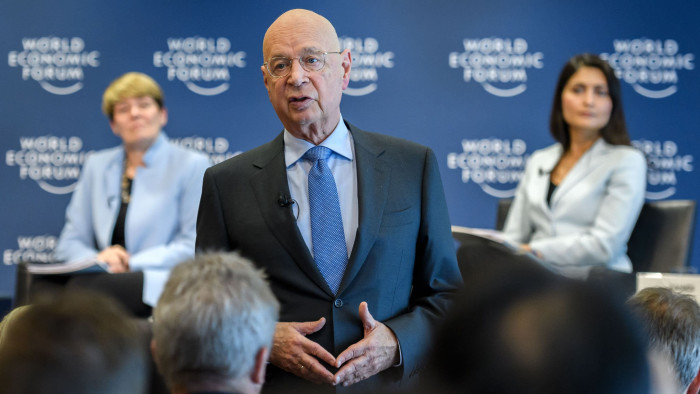Davos founder Schwab defends role of elite economic gathering

Roula Khalaf, Editor of the FT, selects her favourite stories in this weekly newsletter.
Last month the World Economic Forum took an unprecedented step of putting advertisements in two dozen world publications to proclaim that it is embracing a new “stakeholder” manifesto. A cynic might scoff, however, that this WEF vision of inclusive capitalism does not sit easily with its annual meeting in Davos, dominated as it is by the global business elite.
Indeed, Davos has become something of a political target for populists. Boris Johnson, the British prime minister, last month said he had banned his ministers from attending this year’s meeting, railing against the idea of having “champagne with billionaires”. Apparently, though, he thought again and UK chancellor Sajid Javid is expected to attend.
Klaus Schwab, the man who founded the WEF more than half a century ago, insists that critics miss the point. The convening power of the forum, which enables delegates from the public, private and non-governmental worlds to meet, is needed more than ever before today, he says.
“We think what we do is very necessary, and business thinks so too,” he told me last month in Washington. “We never had such a good American business participation.” This year, he says, “the big technology companies will all be present”. The event will not just feature large, listed Silicon Valley players, such as Google and Facebook, but also a host of unlisted tech unicorns attending for the first time.
More broadly, competition remains fierce to secure one of the 3,000 membership slots for Davos. Some 1,500 places are reserved for corporate “members” — even though these members usually pay anything from SFr60,000 to SFr600,000 ($62,000 to $620,000) for the privilege.
What explains such demand? An anthropologist might blame it partly on tribal behaviour: Davos, after all, is a ritualistic gathering where the global corporate elite use established symbols including powerpoints, champagne parties and shopfront billboards to demonstrate status and create the networks needed to cut business deals.
However, Mr Schwab says the longevity of the forum reflects a more practical point: many other 20th-century geopolitical structures are breaking down. “The business community feels just now [that it is living in] such a fractured world. So it’s even more important for them to have a platform to interact,” he points out, noting that Davos is one of the few places where public, private and non-governmental groups can quickly and efficiently interact.
Another factor is that popular disenchantment with politicians has put pressure on the business leaders to become more involved in tackling social and political problems. Recent surveys from Edelman, the public relations group, show that there is now more trust in business as a source of social solutions than government. “People are not asking necessarily any more for politicians [to lead on these projects],” says Mr Schwab. “That is interesting.”
However, as corporate leaders try to respond, both they and politicians are confronting a nasty dilemma: most of the problems which need “solutions” require cross-border answers that national governments cannot provide.
“The underlying assumption is that those big challenges — environmental . . . poverty — cannot be solved by governments alone, or by business alone, or by civil society. You need co-operation,” says Mr Schwab.
“So what we are doing now is to put much more emphasis on this, creating platforms where a business can co-operate with governments and civil society.”
There is also a sense that globalisation and capitalism itself are under attack and need to be redefined. One sign of this emerged last year when the US Business Roundtable (BRT) redefined its mandate to embrace stakeholders, not just shareholders. But while this grabbed headlines, Mr Schwab says that this has always been the WEF’s message. “Davos was always conceived as a platform for stakeholders,” he says. “This is the narrative which has determining my work over the last 50 years . . . now finally we see the US Business Roundtable statement. I feel vindicated!”
There will be plenty of debate about the stakeholder vision this week, and some might be contentious. One crucial difference between the WEF manifesto and the BRT statement is that the former calls for restraint in executive pay but the latter does not. That is because many US business leaders, compared with their European counterparts, are as vociferously opposed to discussing their high levels of compensation as talking about higher taxes. Mr Schwab admits this threatens to undermine debate about inclusive capitalism, but he is wary of offending his US members. “We have to have this debate, but I think you have to also go step by step,” he argues. “If we go too fast there could be a counterreaction.”
Instead, the WEF meeting will focus on issues such as corporate action on climate change, privacy policies for tech companies and better corporate accounting for social and climate issues.
“My dream for Davos is to get the big investors, the hedge funds and so on, together and say we are committing ourselves to finance only investments which are environmentally not damaging,” he says.
The question is whether this will be enough to placate the critics of Davos and drive meaningful change. Half a century after its founding, the tribal rituals of Davos seem not only to have become more deeply entrenched but also more controversial.
Therein lies the challenge for Mr Schwab, as he battles to turn its bold and pious manifesto into something more than hot air.

Comments